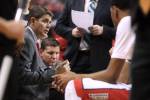Millennium Scholarship Fund may be broke after fall semester
Twenty-year-old Karissa Dold wants to be a doctor. She's wanted to be a doctor ever since she was a kid. She wants to help people.
But becoming a doctor is expensive. There is regular college, where you have to do really well to get into even an average medical school. And then there is medical school itself, where tuition will run into the tens of thousands of dollars.
Dold's dad died when she was in high school. Her mom used to be a nurse a long time ago, but now she's disabled and has very little income.
Dold, however, graduated from high school with a nearly perfect grade-point average, which made her eligible for the Millennium Scholarship. Without it, she said, she has no idea how she would have paid for school. She probably would have gone part time to the community college while she figured things out.
Instead, she just finished her sophomore year at the University of Nevada, Las Vegas, where she's studying biology and psychology. Between the Millennium Scholarship and other scholarships, she basically has a free ride.
That free ride is why she chose UNLV.
"I knew if I stayed in Las Vegas, I'd get it," she said.
Since it was established in 2000, the Millennium Scholarship has paid out more than $240 million to more than 60,000 students.
It pays up to $10,000 for tuition to a Nevada college or university to people who graduated from a Nevada high school with at least a 3.25 grade-point average.
But, like much of state government, the scholarship fund is almost out of money. This past spring semester, the fund actually did run out of money and had to pay its bills late, said Reba Coombs, the program's executive director at the state treasurer's office.
Gov. Brian Sandoval has proposed shoring up the fund with a one-time infusion of $10 million from the state's general fund, as well as continuing its past funding mechanisms.
Those include $7.6 million each year from the state treasurer's unclaimed property division and about $15 million to $18 million a year from the state's share of a national tobacco settlement.
Coombs said Sandoval's plan would keep the scholarship fund healthy perhaps through 2014. It is hard to project much further than that, she said, because the tobacco revenue fluctuates. People have been generally buying fewer cigarettes in the down economy, which means less money for the tobacco fund.
Regardless, Coombs said, without more money, the scholarship fund probably will be broke again after the upcoming fall semester.
While legislative leaders have expressed support for Sandoval's plan, it has yet to get a hearing. Budget matters remain very much in flux, even with the legislative session scheduled to close by 1 a.m. June 7.
"We're just sitting here waiting," Coombs said. "We're very, very anxious to find out what the Legislature is going to do."
The entire state budget process was upended last week when the state Supreme Court ruled many of the funding sources Sandoval proposed were unconstitutional.
Coombs said she is still sending award letters to scholarship recipients, instructing them on the process.
"I just don't know if we're going to be able to pay them," she said.
Coombs said the fund ran into trouble after the first few years because so many students were using it.
Lawmakers responded by increasing the required high school GPA from 3.0 to 3.25, limiting the number of credit hours it covered, and making it harder for students who were not getting good grades in college to keep receiving the money.
The fund was healthy then, until the current recession. To help pay for state government, lawmakers removed the $7.6 million annual contribution to the fund from the unclaimed property division for the past several years.
If lawmakers don't act on Sandoval's proposal, thousands of students could be left with no way to pay for school.
There's Dold, for example, the UNLV student who wants to be a doctor.
There's also UNLV student Michelle Nam.
Nam will be a junior in the fall. She's a student in the honors college, studying social sciences. She said a really great teacher in high school introduced her to the book "Guns, Germs and Steel" by Jared Diamond. The book, a Pulitzer winner, analyzes the history of Western civilization.
That changed her life. She wants to be a historian one day.
She said without the Millennium Scholarship, she doesn't know if she'll get there.
Similarly, David Snyder might not have finished college at all. As it is, he graduated from UNLV this month with two bachelor's degrees, in secondary education and political science.
He started out at Ohio State University after graduating from high school in 2004. But he was studying engineering, and he was in the ROTC program. He eventually figured out neither was for him.
So he came home and went to UNLV with the Millennium Scholarship and a Pell grant. He also worked part time.
He finished school with almost no debt, so now he can go on to graduate school. He wants to study political science, maybe one day join the Peace Corps, maybe get a doctorate degree.
"I don't know if I would have had access to all that without the scholarship," he said. "It really did change everything for me."
Contact reporter Richard Lake at rlake@reviewjournal .com or 702-383-0307.




























